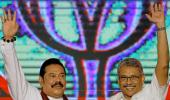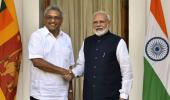Mahinda Rajapaksa will be sworn in as Sri Lanka's Prime Minister for the fourth time on Sunday after his party registered a landslide victory in the general election, securing two-thirds majority in Parliament needed to amend the Constitution to further consolidate the powerful Rajapaksa family's grip on power.

The Sri Lanka People's Party (SLPP), led by prime minister Mahinda Rajapaksa, won in 145 constituencies, bagging a total of 150 seats with its allies, a two-thirds majority in the 225-member Parliament, according to the results announced by the election commission on Friday.
It won all but four of the 22 electoral districts on offer, polling 6.8 million votes (59.9 per cent).
The 74-year-old Prime Minister Mahinda thanked the Sri Lankan people for putting their faith in the SLPP and said that the country will not stand disappointed during its tenure.
'Heartfelt gratitude to all SriLankans for placing their trust in President Gotabaya Rajapaksa, myself and the PodujanaParty and voting for the 'Saubhagye Dakkama' election manifesto in overwhelming numbers. We will ensure Sri Lanka will not stand disappointed during our tenure,' he said.
Mahinda will be sworn in as the new prime minister for the fourth time on Sunday at a ceremony at the historic Buddhist temple of Kelaniya, a north Colombo suburb, according to an official statement.
He created a record in polling over 500,000 individual preference votes, the highest ever recorded by a candidate in the history of elections.
Prime Minister Narendra Modi was among the first world leaders to congratulate Mahinda on the outcome of the elections and said the two sides will work together to further advance all areas of bilateral cooperation and to take their special ties to ever newer heights.
"Thank you PM @narendramodi for your congratulatory phone call. With the strong support of the people of #SriLanka, I look forward to working with you closely to further enhance the long-standing cooperation between our two countries. Sri Lanka & India are friends & relations," Mahinda tweeted.
The Rajapaksa family has dominated Sri Lankan politics for two decades. Mahinda was previously president, from 2005 to 2015.
President Gotabaya Rajapaksa had won the November presidential election on the SLPP ticket.
In the parliamentary election, he was seeking 150 seats mandatory to execute constitutional changes, including to repeal the 19th Amendment to the Constitution which had curbed the presidential powers while strengthening the role of Parliament.
Activists, already alarmed by the diminishing space for dissent and criticism in the island nation, fear such a move could lead to authoritarianism.
Meanwhile, the biggest casualty from the election outcome was the United National Party (UNP) of former prime minister Ranil Wickremesinghe.
The UNP managed to win only one seat and that too came thanks to the cumulative votes polled nationally. The country's grand old party failed to win a single seat from any of the 22 districts.
Its leader and four-time prime minister was unseated for the first time since he entered Parliament in 1977. Wickremesinghe failed to win from Colombo district as his party finished fourth in most constituencies.
The UNP only polled 249,435 votes or just two per cent of the total votes and was relegated to the fifth position nationally.
Wickremesinghe's former deputy and presidential candidate Sajith Premadasa, who had broken away from the UNP to form his own party Samagi Jana Balawegaya (SJB), has done well by winning 55 seats with its main Muslim party ally bagging it the solitary district win in the eastern port district of Trincomalee.
The SJB has polled a total of 2.7 million (23 per cent) votes, emerging as the second largest party, according to the results.
The main Tamil party, Tamil National Alliance, did not fare well as their parliamentary representation saw a reduction for a total of 10 seats from 16 it had won the last time.
The party managed to win three districts in the Tamil-dominated North and polled 327,168 votes (2.82 per cent), the results showed.
The Marxist Janatha Vimukthi Peramuna (JVP), despite winning only three seats from their six in the previous election, retained its position as the third force in the country by pushing the former ruling party UNP to the fourth and in many areas to even fifth and sixth places. It polled 445,958 (3.84 per cent) of the total votes.
SLPP founder and its National Organiser Basil Rajapaksa -- who is the younger brother of President Gotabaya with the eldest being Prime Minister Mahinda -- on Thursday said that the party is all set to form a new government.
The SJB with under 60 seats has emerged as the main Opposition party after its mother party, the UNP, was reduced to a single seat in the most shocking outcome of the election.
The UNP said that it has 'encountered the greatest setback in its history. As a party, we faced many challenges internally as well as externally'.
According to the final results, a Buddhist monk is to enter Parliament from the Opposition.
Firebrand monk Galagodaatte Gnanasara, who is from Our People's Power Party, was in jail for contempt of court and was also accused of encouraging anti-Muslim sentiments in 2013.
Sri Lanka had Buddhist monks continuously as MPs since 2004. The number was reduced to one in the last Parliament from as many as nine monk MPs in 2004.










 © 2025
© 2025